Audit and Assurance: Ethical Issues and Safeguards in Auditing
VerifiedAdded on 2021/04/21
|9
|2271
|21
Report
AI Summary
This report provides a comprehensive analysis of audit and assurance, focusing on the ethical considerations and principles that guide the profession. The report begins by defining audit and its importance in ensuring the accuracy and fairness of financial statements. It then delves into the role of the International Ethics Standards Board for Accountants (IESBA) in setting high-quality ethical standards for professional accountants globally. The report examines the factors that can influence the principle of objectivity, which is crucial for maintaining auditor independence and unbiased judgment. Several real-world situations are assessed, including unwarranted financial reliance on clients, financial interests in audit clients, auditors' involvement in family ties or close relationships, the provision of non-audit services, and the longevity of the audit firm's relationship with a client. For each situation, the report identifies potential threats to objectivity, outlines probable consequences, and provides recommendations for safeguards to mitigate risks and uphold ethical standards. The report concludes by emphasizing the importance of maintaining audit quality and adhering to ethical principles to ensure that financial statements accurately reflect a company's true financial position. This report from Desklib provides valuable insights into the practical application of ethical standards in the field of auditing.
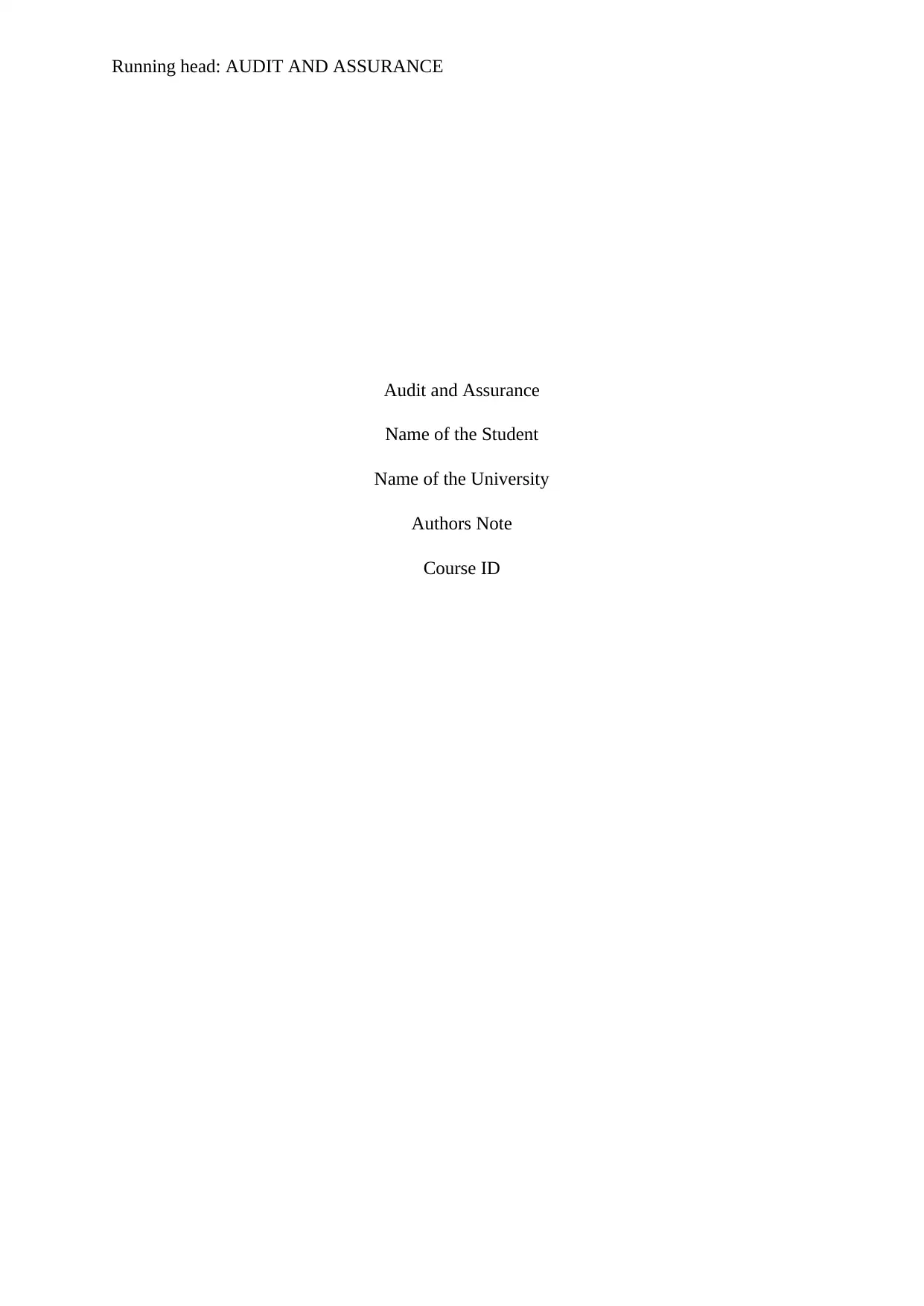
Running head: AUDIT AND ASSURANCE
Audit and Assurance
Name of the Student
Name of the University
Authors Note
Course ID
Audit and Assurance
Name of the Student
Name of the University
Authors Note
Course ID
Paraphrase This Document
Need a fresh take? Get an instant paraphrase of this document with our AI Paraphraser
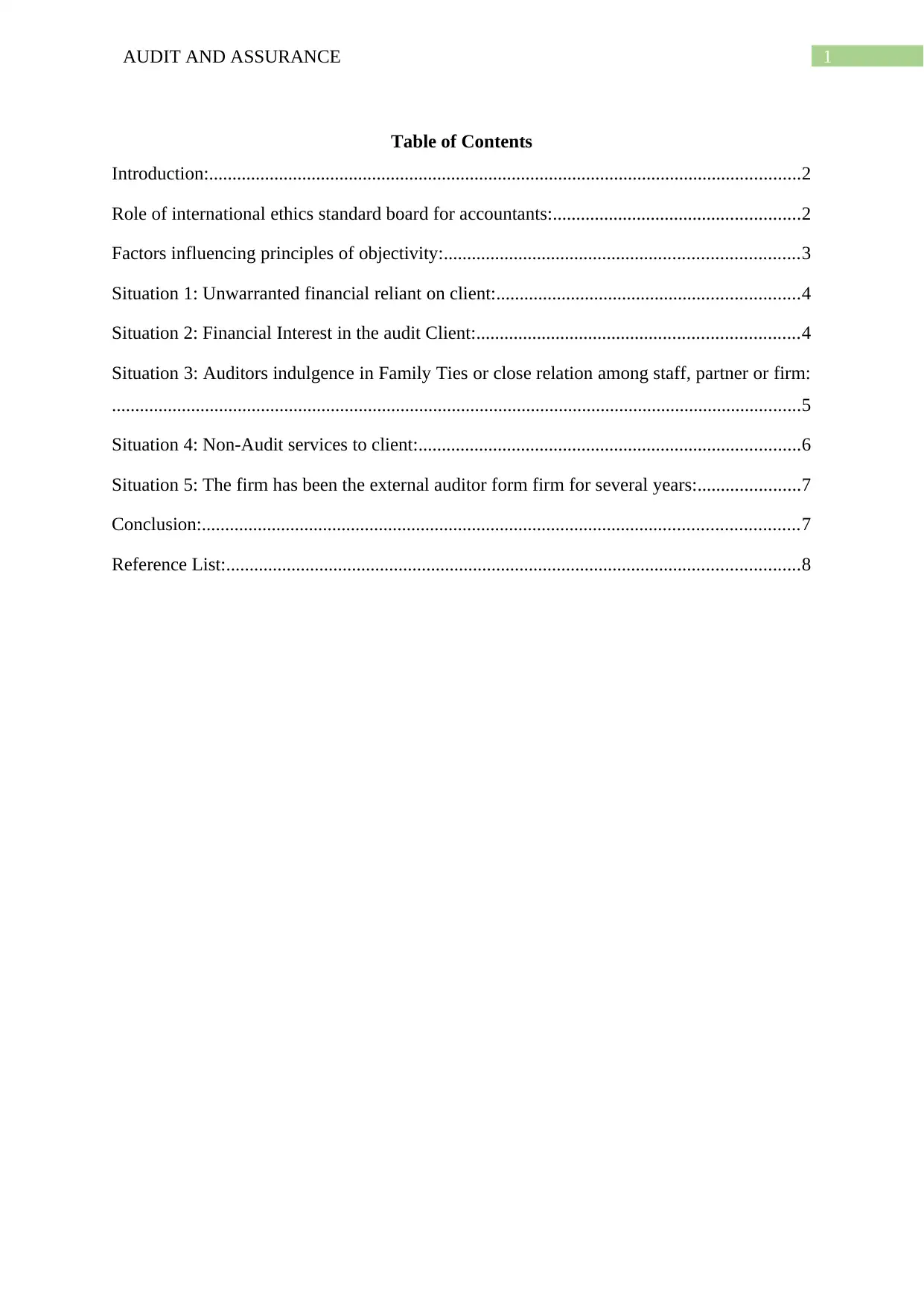
1AUDIT AND ASSURANCE
Table of Contents
Introduction:...............................................................................................................................2
Role of international ethics standard board for accountants:.....................................................2
Factors influencing principles of objectivity:............................................................................3
Situation 1: Unwarranted financial reliant on client:.................................................................4
Situation 2: Financial Interest in the audit Client:.....................................................................4
Situation 3: Auditors indulgence in Family Ties or close relation among staff, partner or firm:
....................................................................................................................................................5
Situation 4: Non-Audit services to client:..................................................................................6
Situation 5: The firm has been the external auditor form firm for several years:......................7
Conclusion:................................................................................................................................7
Reference List:...........................................................................................................................8
Table of Contents
Introduction:...............................................................................................................................2
Role of international ethics standard board for accountants:.....................................................2
Factors influencing principles of objectivity:............................................................................3
Situation 1: Unwarranted financial reliant on client:.................................................................4
Situation 2: Financial Interest in the audit Client:.....................................................................4
Situation 3: Auditors indulgence in Family Ties or close relation among staff, partner or firm:
....................................................................................................................................................5
Situation 4: Non-Audit services to client:..................................................................................6
Situation 5: The firm has been the external auditor form firm for several years:......................7
Conclusion:................................................................................................................................7
Reference List:...........................................................................................................................8
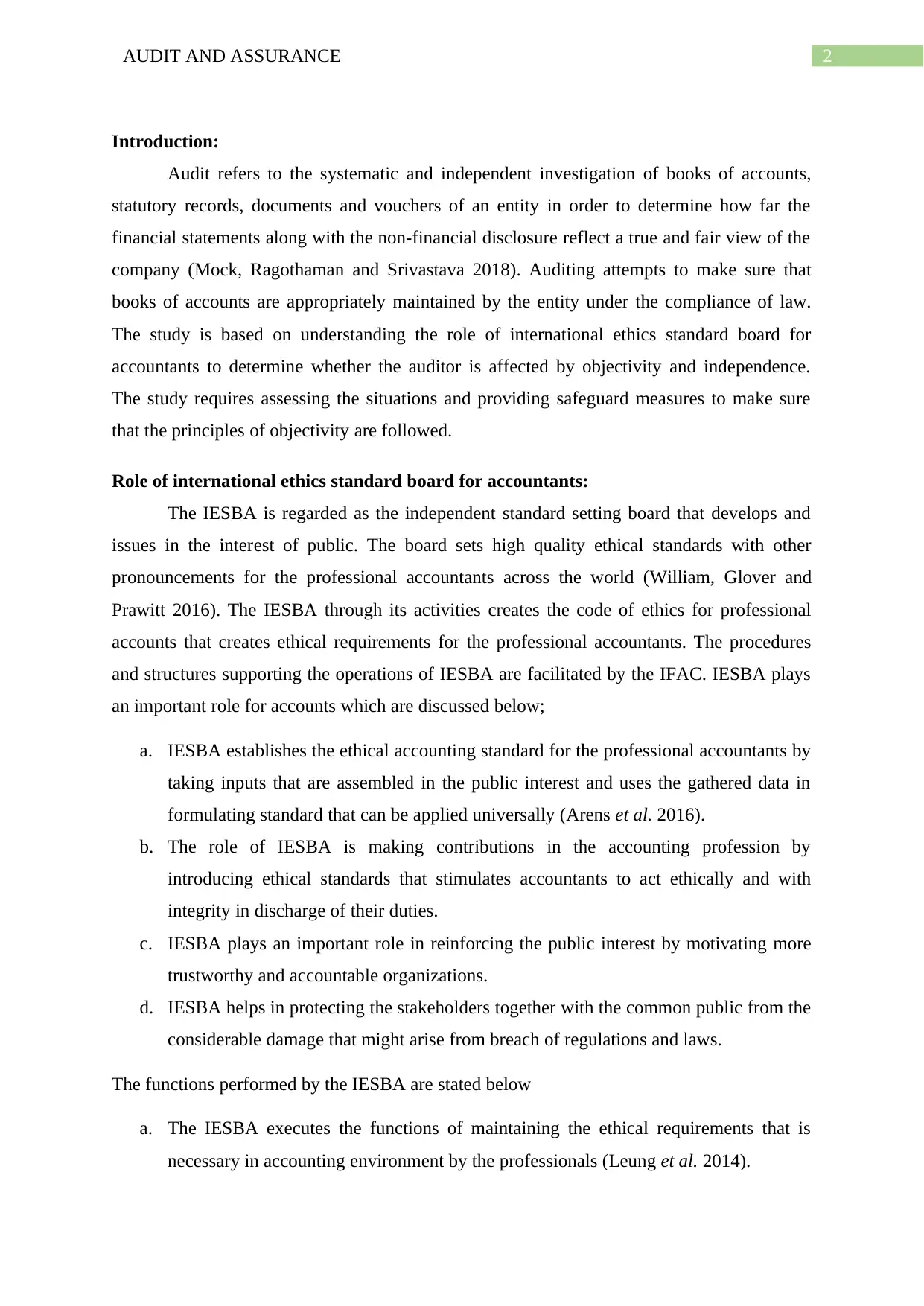
2AUDIT AND ASSURANCE
Introduction:
Audit refers to the systematic and independent investigation of books of accounts,
statutory records, documents and vouchers of an entity in order to determine how far the
financial statements along with the non-financial disclosure reflect a true and fair view of the
company (Mock, Ragothaman and Srivastava 2018). Auditing attempts to make sure that
books of accounts are appropriately maintained by the entity under the compliance of law.
The study is based on understanding the role of international ethics standard board for
accountants to determine whether the auditor is affected by objectivity and independence.
The study requires assessing the situations and providing safeguard measures to make sure
that the principles of objectivity are followed.
Role of international ethics standard board for accountants:
The IESBA is regarded as the independent standard setting board that develops and
issues in the interest of public. The board sets high quality ethical standards with other
pronouncements for the professional accountants across the world (William, Glover and
Prawitt 2016). The IESBA through its activities creates the code of ethics for professional
accounts that creates ethical requirements for the professional accountants. The procedures
and structures supporting the operations of IESBA are facilitated by the IFAC. IESBA plays
an important role for accounts which are discussed below;
a. IESBA establishes the ethical accounting standard for the professional accountants by
taking inputs that are assembled in the public interest and uses the gathered data in
formulating standard that can be applied universally (Arens et al. 2016).
b. The role of IESBA is making contributions in the accounting profession by
introducing ethical standards that stimulates accountants to act ethically and with
integrity in discharge of their duties.
c. IESBA plays an important role in reinforcing the public interest by motivating more
trustworthy and accountable organizations.
d. IESBA helps in protecting the stakeholders together with the common public from the
considerable damage that might arise from breach of regulations and laws.
The functions performed by the IESBA are stated below
a. The IESBA executes the functions of maintaining the ethical requirements that is
necessary in accounting environment by the professionals (Leung et al. 2014).
Introduction:
Audit refers to the systematic and independent investigation of books of accounts,
statutory records, documents and vouchers of an entity in order to determine how far the
financial statements along with the non-financial disclosure reflect a true and fair view of the
company (Mock, Ragothaman and Srivastava 2018). Auditing attempts to make sure that
books of accounts are appropriately maintained by the entity under the compliance of law.
The study is based on understanding the role of international ethics standard board for
accountants to determine whether the auditor is affected by objectivity and independence.
The study requires assessing the situations and providing safeguard measures to make sure
that the principles of objectivity are followed.
Role of international ethics standard board for accountants:
The IESBA is regarded as the independent standard setting board that develops and
issues in the interest of public. The board sets high quality ethical standards with other
pronouncements for the professional accountants across the world (William, Glover and
Prawitt 2016). The IESBA through its activities creates the code of ethics for professional
accounts that creates ethical requirements for the professional accountants. The procedures
and structures supporting the operations of IESBA are facilitated by the IFAC. IESBA plays
an important role for accounts which are discussed below;
a. IESBA establishes the ethical accounting standard for the professional accountants by
taking inputs that are assembled in the public interest and uses the gathered data in
formulating standard that can be applied universally (Arens et al. 2016).
b. The role of IESBA is making contributions in the accounting profession by
introducing ethical standards that stimulates accountants to act ethically and with
integrity in discharge of their duties.
c. IESBA plays an important role in reinforcing the public interest by motivating more
trustworthy and accountable organizations.
d. IESBA helps in protecting the stakeholders together with the common public from the
considerable damage that might arise from breach of regulations and laws.
The functions performed by the IESBA are stated below
a. The IESBA executes the functions of maintaining the ethical requirements that is
necessary in accounting environment by the professionals (Leung et al. 2014).
⊘ This is a preview!⊘
Do you want full access?
Subscribe today to unlock all pages.

Trusted by 1+ million students worldwide
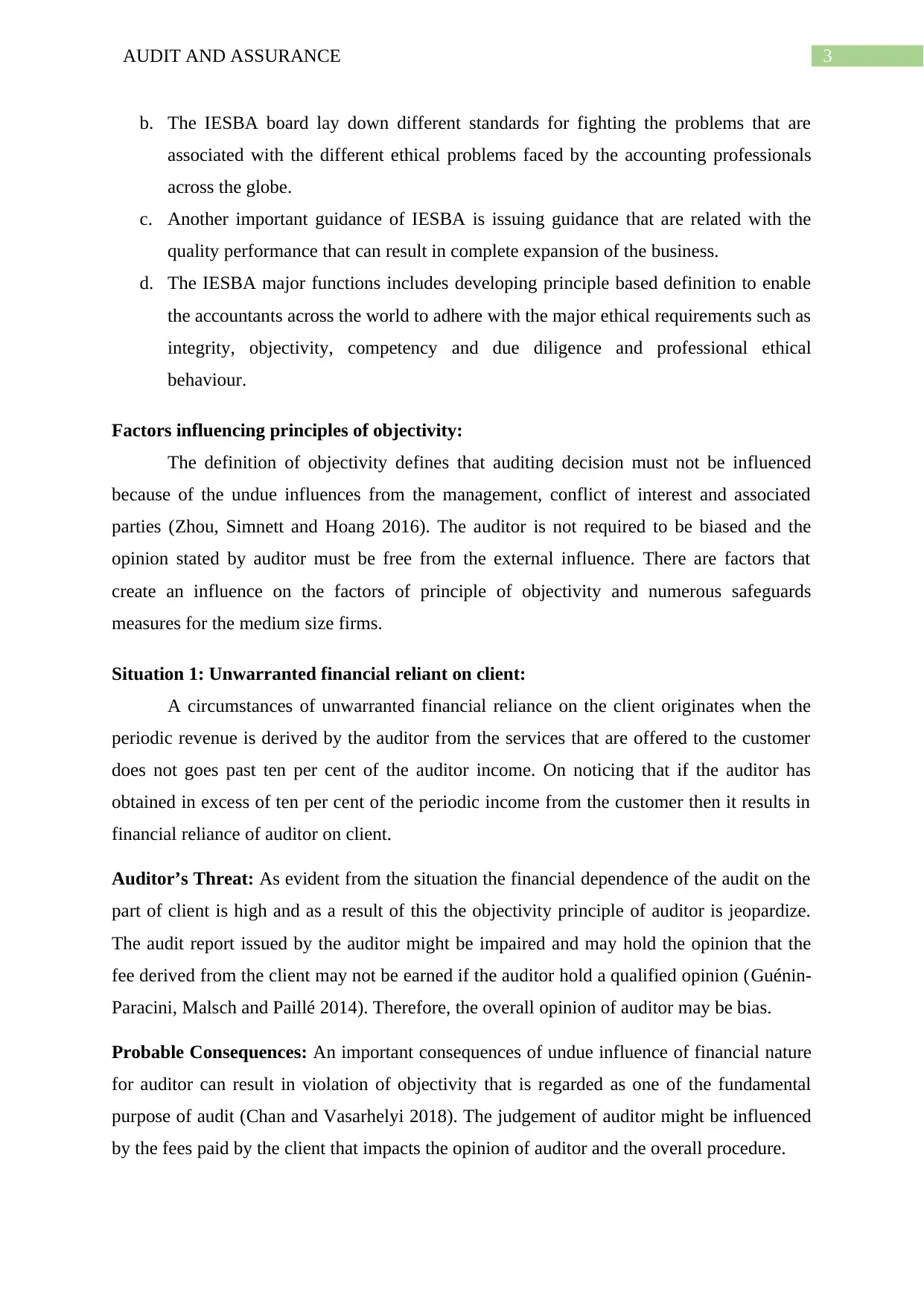
3AUDIT AND ASSURANCE
b. The IESBA board lay down different standards for fighting the problems that are
associated with the different ethical problems faced by the accounting professionals
across the globe.
c. Another important guidance of IESBA is issuing guidance that are related with the
quality performance that can result in complete expansion of the business.
d. The IESBA major functions includes developing principle based definition to enable
the accountants across the world to adhere with the major ethical requirements such as
integrity, objectivity, competency and due diligence and professional ethical
behaviour.
Factors influencing principles of objectivity:
The definition of objectivity defines that auditing decision must not be influenced
because of the undue influences from the management, conflict of interest and associated
parties (Zhou, Simnett and Hoang 2016). The auditor is not required to be biased and the
opinion stated by auditor must be free from the external influence. There are factors that
create an influence on the factors of principle of objectivity and numerous safeguards
measures for the medium size firms.
Situation 1: Unwarranted financial reliant on client:
A circumstances of unwarranted financial reliance on the client originates when the
periodic revenue is derived by the auditor from the services that are offered to the customer
does not goes past ten per cent of the auditor income. On noticing that if the auditor has
obtained in excess of ten per cent of the periodic income from the customer then it results in
financial reliance of auditor on client.
Auditor’s Threat: As evident from the situation the financial dependence of the audit on the
part of client is high and as a result of this the objectivity principle of auditor is jeopardize.
The audit report issued by the auditor might be impaired and may hold the opinion that the
fee derived from the client may not be earned if the auditor hold a qualified opinion (Guénin-
Paracini, Malsch and Paillé 2014). Therefore, the overall opinion of auditor may be bias.
Probable Consequences: An important consequences of undue influence of financial nature
for auditor can result in violation of objectivity that is regarded as one of the fundamental
purpose of audit (Chan and Vasarhelyi 2018). The judgement of auditor might be influenced
by the fees paid by the client that impacts the opinion of auditor and the overall procedure.
b. The IESBA board lay down different standards for fighting the problems that are
associated with the different ethical problems faced by the accounting professionals
across the globe.
c. Another important guidance of IESBA is issuing guidance that are related with the
quality performance that can result in complete expansion of the business.
d. The IESBA major functions includes developing principle based definition to enable
the accountants across the world to adhere with the major ethical requirements such as
integrity, objectivity, competency and due diligence and professional ethical
behaviour.
Factors influencing principles of objectivity:
The definition of objectivity defines that auditing decision must not be influenced
because of the undue influences from the management, conflict of interest and associated
parties (Zhou, Simnett and Hoang 2016). The auditor is not required to be biased and the
opinion stated by auditor must be free from the external influence. There are factors that
create an influence on the factors of principle of objectivity and numerous safeguards
measures for the medium size firms.
Situation 1: Unwarranted financial reliant on client:
A circumstances of unwarranted financial reliance on the client originates when the
periodic revenue is derived by the auditor from the services that are offered to the customer
does not goes past ten per cent of the auditor income. On noticing that if the auditor has
obtained in excess of ten per cent of the periodic income from the customer then it results in
financial reliance of auditor on client.
Auditor’s Threat: As evident from the situation the financial dependence of the audit on the
part of client is high and as a result of this the objectivity principle of auditor is jeopardize.
The audit report issued by the auditor might be impaired and may hold the opinion that the
fee derived from the client may not be earned if the auditor hold a qualified opinion (Guénin-
Paracini, Malsch and Paillé 2014). Therefore, the overall opinion of auditor may be bias.
Probable Consequences: An important consequences of undue influence of financial nature
for auditor can result in violation of objectivity that is regarded as one of the fundamental
purpose of audit (Chan and Vasarhelyi 2018). The judgement of auditor might be influenced
by the fees paid by the client that impacts the opinion of auditor and the overall procedure.
Paraphrase This Document
Need a fresh take? Get an instant paraphrase of this document with our AI Paraphraser
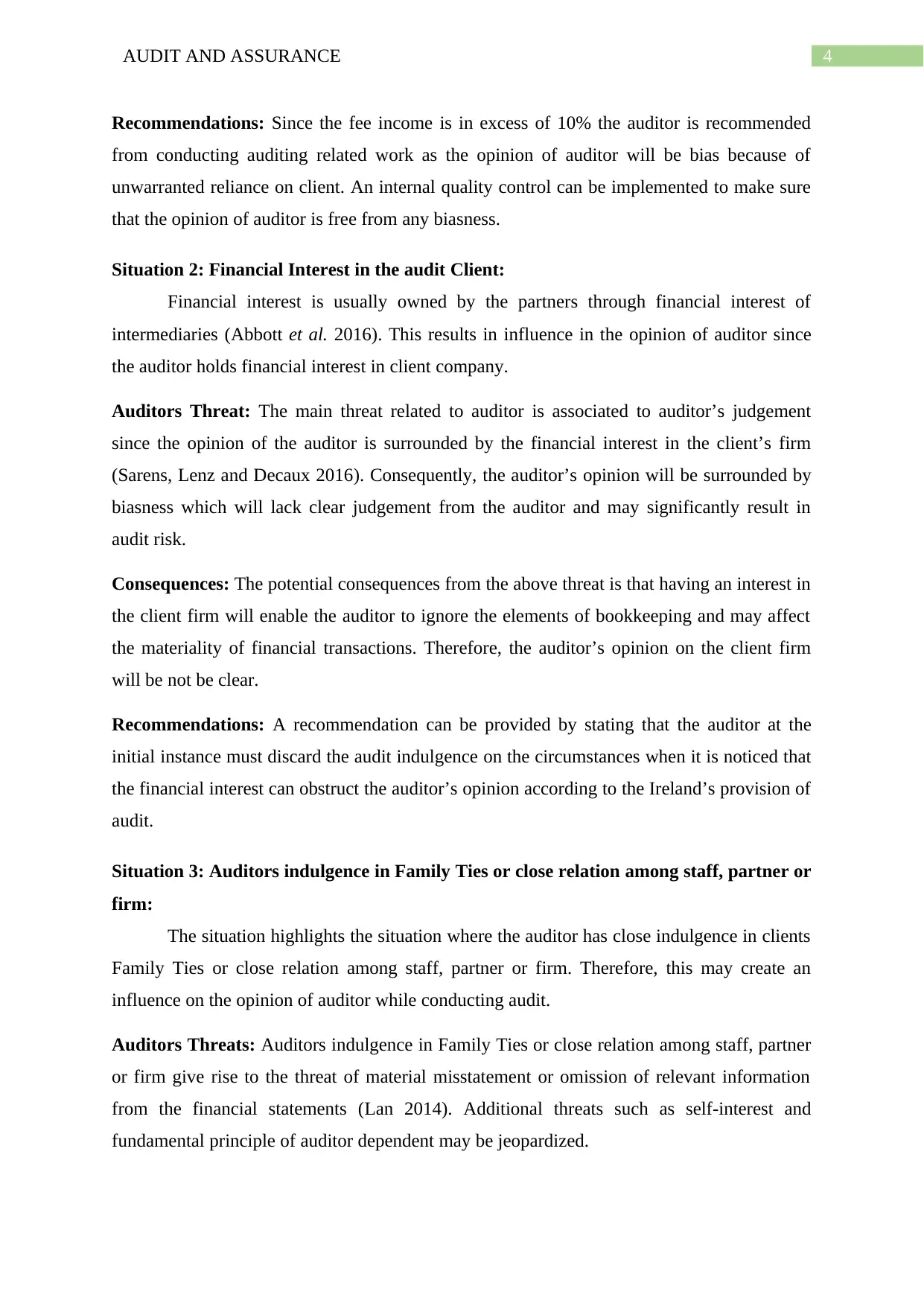
4AUDIT AND ASSURANCE
Recommendations: Since the fee income is in excess of 10% the auditor is recommended
from conducting auditing related work as the opinion of auditor will be bias because of
unwarranted reliance on client. An internal quality control can be implemented to make sure
that the opinion of auditor is free from any biasness.
Situation 2: Financial Interest in the audit Client:
Financial interest is usually owned by the partners through financial interest of
intermediaries (Abbott et al. 2016). This results in influence in the opinion of auditor since
the auditor holds financial interest in client company.
Auditors Threat: The main threat related to auditor is associated to auditor’s judgement
since the opinion of the auditor is surrounded by the financial interest in the client’s firm
(Sarens, Lenz and Decaux 2016). Consequently, the auditor’s opinion will be surrounded by
biasness which will lack clear judgement from the auditor and may significantly result in
audit risk.
Consequences: The potential consequences from the above threat is that having an interest in
the client firm will enable the auditor to ignore the elements of bookkeeping and may affect
the materiality of financial transactions. Therefore, the auditor’s opinion on the client firm
will be not be clear.
Recommendations: A recommendation can be provided by stating that the auditor at the
initial instance must discard the audit indulgence on the circumstances when it is noticed that
the financial interest can obstruct the auditor’s opinion according to the Ireland’s provision of
audit.
Situation 3: Auditors indulgence in Family Ties or close relation among staff, partner or
firm:
The situation highlights the situation where the auditor has close indulgence in clients
Family Ties or close relation among staff, partner or firm. Therefore, this may create an
influence on the opinion of auditor while conducting audit.
Auditors Threats: Auditors indulgence in Family Ties or close relation among staff, partner
or firm give rise to the threat of material misstatement or omission of relevant information
from the financial statements (Lan 2014). Additional threats such as self-interest and
fundamental principle of auditor dependent may be jeopardized.
Recommendations: Since the fee income is in excess of 10% the auditor is recommended
from conducting auditing related work as the opinion of auditor will be bias because of
unwarranted reliance on client. An internal quality control can be implemented to make sure
that the opinion of auditor is free from any biasness.
Situation 2: Financial Interest in the audit Client:
Financial interest is usually owned by the partners through financial interest of
intermediaries (Abbott et al. 2016). This results in influence in the opinion of auditor since
the auditor holds financial interest in client company.
Auditors Threat: The main threat related to auditor is associated to auditor’s judgement
since the opinion of the auditor is surrounded by the financial interest in the client’s firm
(Sarens, Lenz and Decaux 2016). Consequently, the auditor’s opinion will be surrounded by
biasness which will lack clear judgement from the auditor and may significantly result in
audit risk.
Consequences: The potential consequences from the above threat is that having an interest in
the client firm will enable the auditor to ignore the elements of bookkeeping and may affect
the materiality of financial transactions. Therefore, the auditor’s opinion on the client firm
will be not be clear.
Recommendations: A recommendation can be provided by stating that the auditor at the
initial instance must discard the audit indulgence on the circumstances when it is noticed that
the financial interest can obstruct the auditor’s opinion according to the Ireland’s provision of
audit.
Situation 3: Auditors indulgence in Family Ties or close relation among staff, partner or
firm:
The situation highlights the situation where the auditor has close indulgence in clients
Family Ties or close relation among staff, partner or firm. Therefore, this may create an
influence on the opinion of auditor while conducting audit.
Auditors Threats: Auditors indulgence in Family Ties or close relation among staff, partner
or firm give rise to the threat of material misstatement or omission of relevant information
from the financial statements (Lan 2014). Additional threats such as self-interest and
fundamental principle of auditor dependent may be jeopardized.
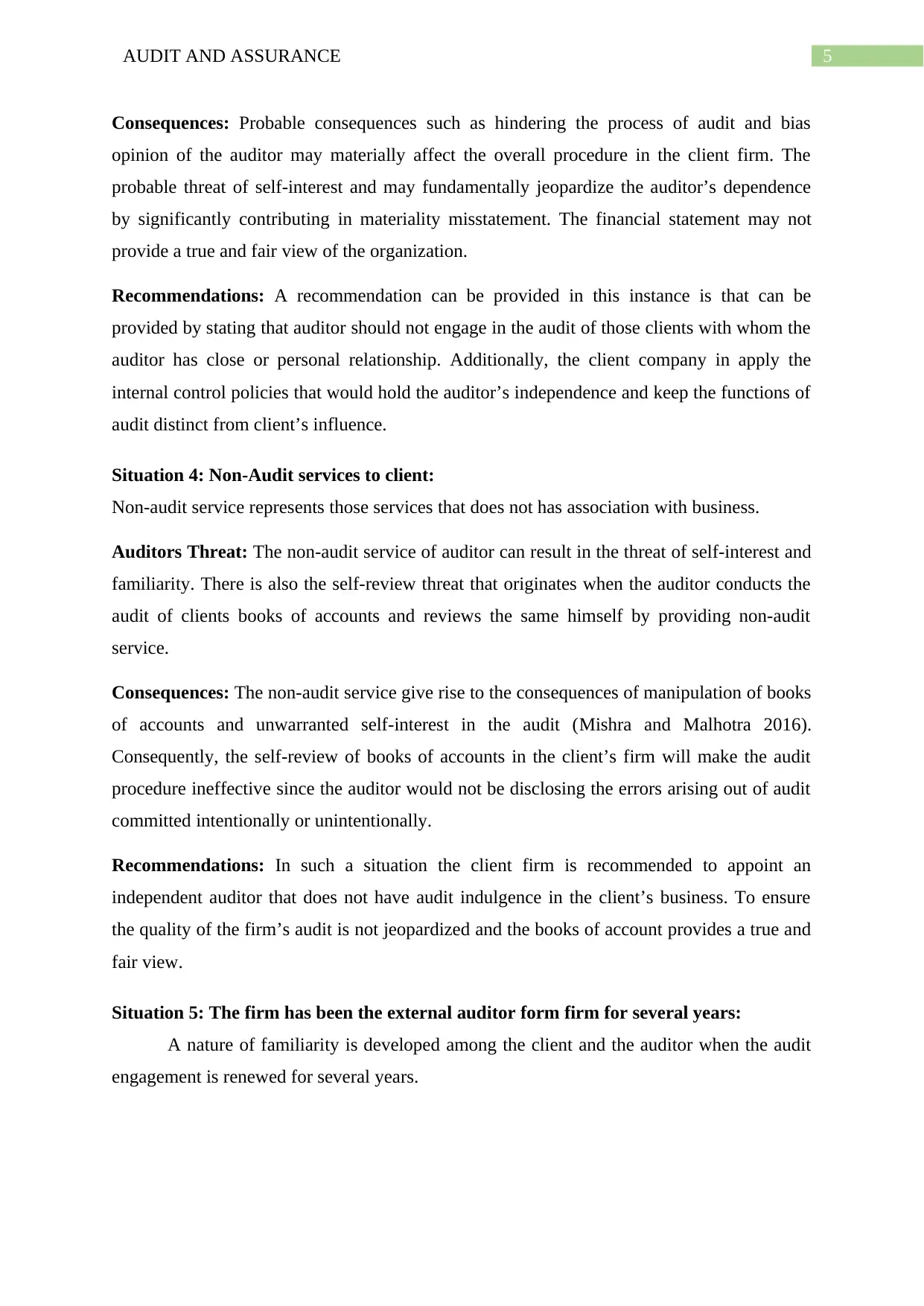
5AUDIT AND ASSURANCE
Consequences: Probable consequences such as hindering the process of audit and bias
opinion of the auditor may materially affect the overall procedure in the client firm. The
probable threat of self-interest and may fundamentally jeopardize the auditor’s dependence
by significantly contributing in materiality misstatement. The financial statement may not
provide a true and fair view of the organization.
Recommendations: A recommendation can be provided in this instance is that can be
provided by stating that auditor should not engage in the audit of those clients with whom the
auditor has close or personal relationship. Additionally, the client company in apply the
internal control policies that would hold the auditor’s independence and keep the functions of
audit distinct from client’s influence.
Situation 4: Non-Audit services to client:
Non-audit service represents those services that does not has association with business.
Auditors Threat: The non-audit service of auditor can result in the threat of self-interest and
familiarity. There is also the self-review threat that originates when the auditor conducts the
audit of clients books of accounts and reviews the same himself by providing non-audit
service.
Consequences: The non-audit service give rise to the consequences of manipulation of books
of accounts and unwarranted self-interest in the audit (Mishra and Malhotra 2016).
Consequently, the self-review of books of accounts in the client’s firm will make the audit
procedure ineffective since the auditor would not be disclosing the errors arising out of audit
committed intentionally or unintentionally.
Recommendations: In such a situation the client firm is recommended to appoint an
independent auditor that does not have audit indulgence in the client’s business. To ensure
the quality of the firm’s audit is not jeopardized and the books of account provides a true and
fair view.
Situation 5: The firm has been the external auditor form firm for several years:
A nature of familiarity is developed among the client and the auditor when the audit
engagement is renewed for several years.
Consequences: Probable consequences such as hindering the process of audit and bias
opinion of the auditor may materially affect the overall procedure in the client firm. The
probable threat of self-interest and may fundamentally jeopardize the auditor’s dependence
by significantly contributing in materiality misstatement. The financial statement may not
provide a true and fair view of the organization.
Recommendations: A recommendation can be provided in this instance is that can be
provided by stating that auditor should not engage in the audit of those clients with whom the
auditor has close or personal relationship. Additionally, the client company in apply the
internal control policies that would hold the auditor’s independence and keep the functions of
audit distinct from client’s influence.
Situation 4: Non-Audit services to client:
Non-audit service represents those services that does not has association with business.
Auditors Threat: The non-audit service of auditor can result in the threat of self-interest and
familiarity. There is also the self-review threat that originates when the auditor conducts the
audit of clients books of accounts and reviews the same himself by providing non-audit
service.
Consequences: The non-audit service give rise to the consequences of manipulation of books
of accounts and unwarranted self-interest in the audit (Mishra and Malhotra 2016).
Consequently, the self-review of books of accounts in the client’s firm will make the audit
procedure ineffective since the auditor would not be disclosing the errors arising out of audit
committed intentionally or unintentionally.
Recommendations: In such a situation the client firm is recommended to appoint an
independent auditor that does not have audit indulgence in the client’s business. To ensure
the quality of the firm’s audit is not jeopardized and the books of account provides a true and
fair view.
Situation 5: The firm has been the external auditor form firm for several years:
A nature of familiarity is developed among the client and the auditor when the audit
engagement is renewed for several years.
⊘ This is a preview!⊘
Do you want full access?
Subscribe today to unlock all pages.

Trusted by 1+ million students worldwide
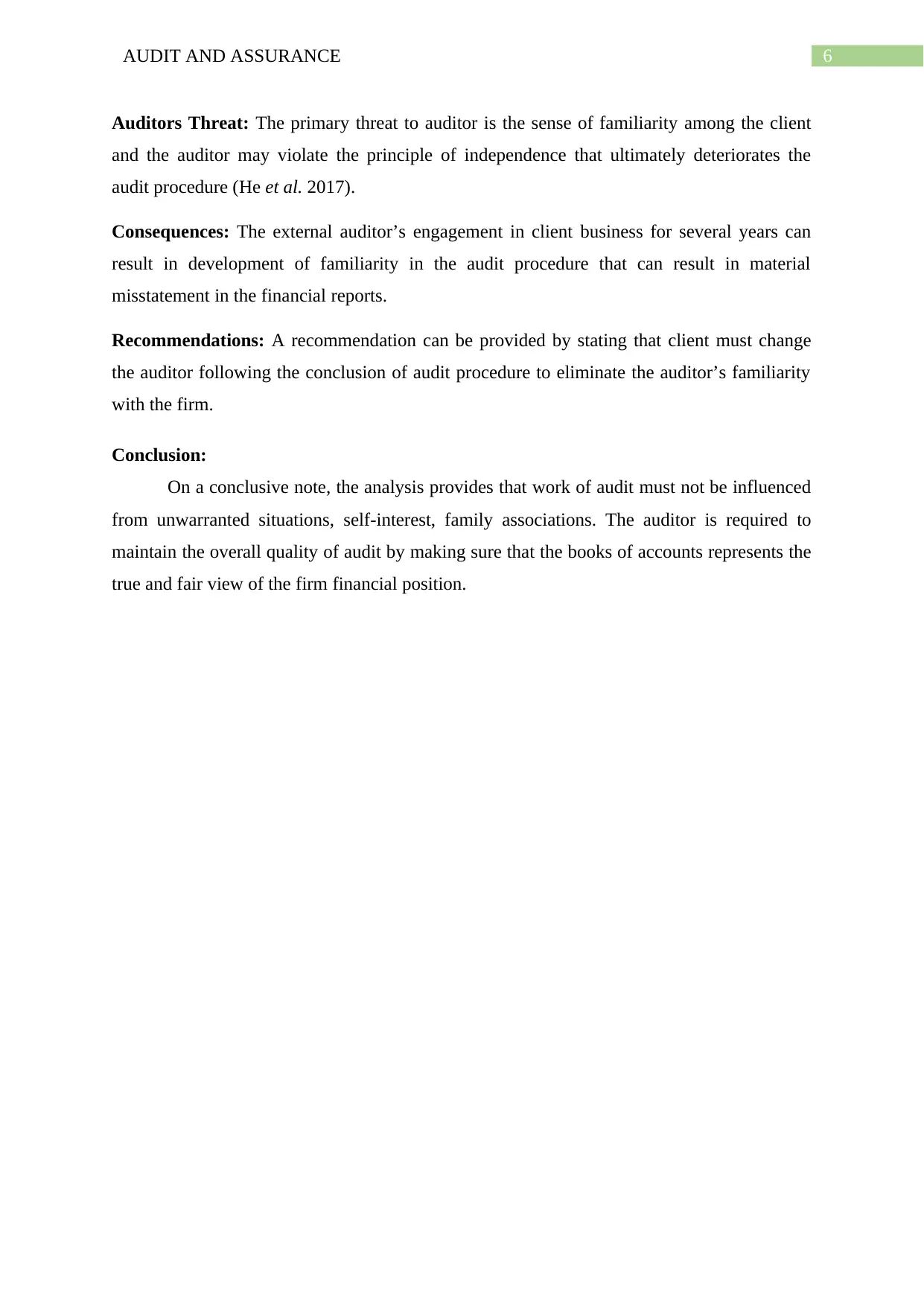
6AUDIT AND ASSURANCE
Auditors Threat: The primary threat to auditor is the sense of familiarity among the client
and the auditor may violate the principle of independence that ultimately deteriorates the
audit procedure (He et al. 2017).
Consequences: The external auditor’s engagement in client business for several years can
result in development of familiarity in the audit procedure that can result in material
misstatement in the financial reports.
Recommendations: A recommendation can be provided by stating that client must change
the auditor following the conclusion of audit procedure to eliminate the auditor’s familiarity
with the firm.
Conclusion:
On a conclusive note, the analysis provides that work of audit must not be influenced
from unwarranted situations, self-interest, family associations. The auditor is required to
maintain the overall quality of audit by making sure that the books of accounts represents the
true and fair view of the firm financial position.
Auditors Threat: The primary threat to auditor is the sense of familiarity among the client
and the auditor may violate the principle of independence that ultimately deteriorates the
audit procedure (He et al. 2017).
Consequences: The external auditor’s engagement in client business for several years can
result in development of familiarity in the audit procedure that can result in material
misstatement in the financial reports.
Recommendations: A recommendation can be provided by stating that client must change
the auditor following the conclusion of audit procedure to eliminate the auditor’s familiarity
with the firm.
Conclusion:
On a conclusive note, the analysis provides that work of audit must not be influenced
from unwarranted situations, self-interest, family associations. The auditor is required to
maintain the overall quality of audit by making sure that the books of accounts represents the
true and fair view of the firm financial position.
Paraphrase This Document
Need a fresh take? Get an instant paraphrase of this document with our AI Paraphraser
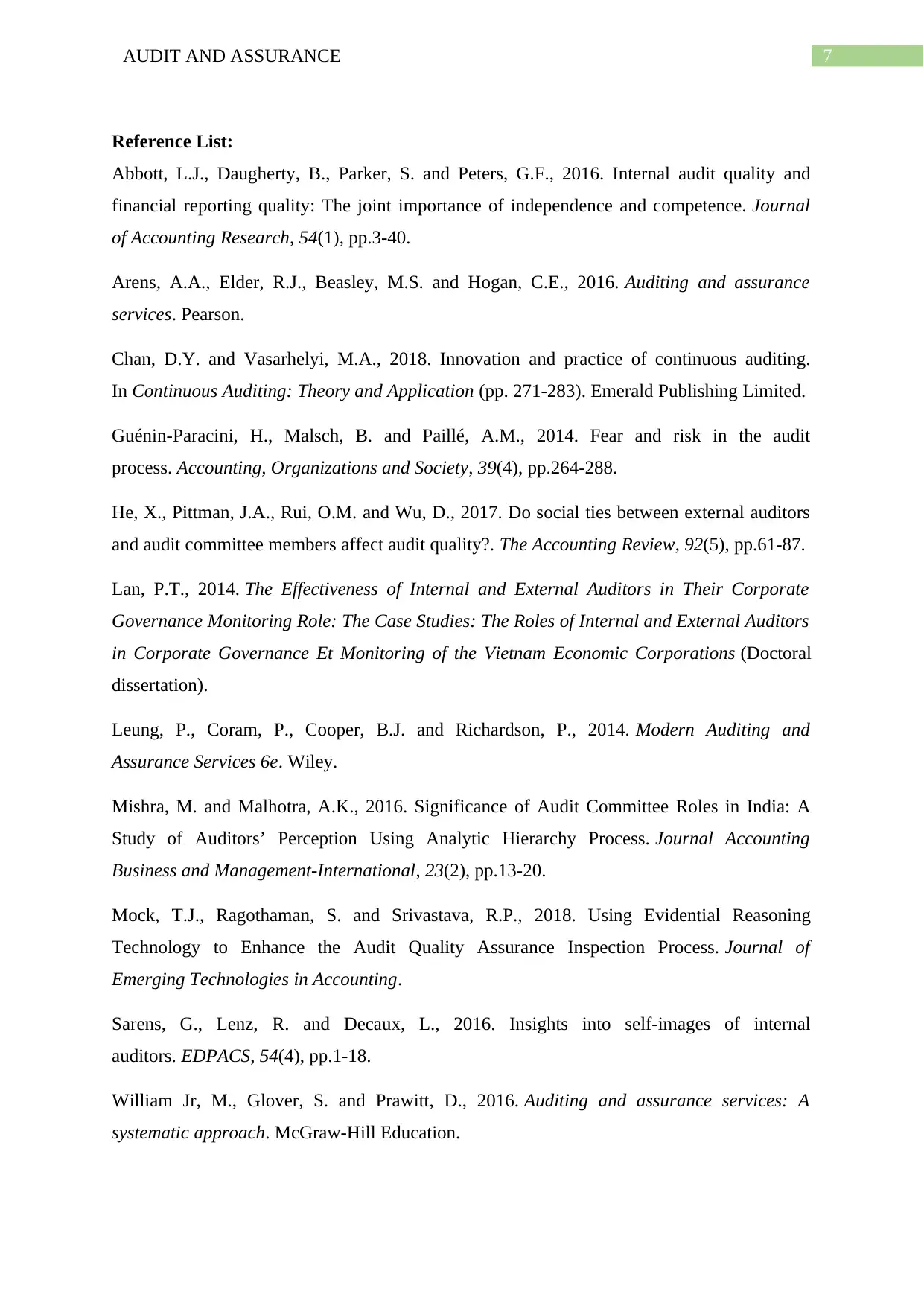
7AUDIT AND ASSURANCE
Reference List:
Abbott, L.J., Daugherty, B., Parker, S. and Peters, G.F., 2016. Internal audit quality and
financial reporting quality: The joint importance of independence and competence. Journal
of Accounting Research, 54(1), pp.3-40.
Arens, A.A., Elder, R.J., Beasley, M.S. and Hogan, C.E., 2016. Auditing and assurance
services. Pearson.
Chan, D.Y. and Vasarhelyi, M.A., 2018. Innovation and practice of continuous auditing.
In Continuous Auditing: Theory and Application (pp. 271-283). Emerald Publishing Limited.
Guénin-Paracini, H., Malsch, B. and Paillé, A.M., 2014. Fear and risk in the audit
process. Accounting, Organizations and Society, 39(4), pp.264-288.
He, X., Pittman, J.A., Rui, O.M. and Wu, D., 2017. Do social ties between external auditors
and audit committee members affect audit quality?. The Accounting Review, 92(5), pp.61-87.
Lan, P.T., 2014. The Effectiveness of Internal and External Auditors in Their Corporate
Governance Monitoring Role: The Case Studies: The Roles of Internal and External Auditors
in Corporate Governance Et Monitoring of the Vietnam Economic Corporations (Doctoral
dissertation).
Leung, P., Coram, P., Cooper, B.J. and Richardson, P., 2014. Modern Auditing and
Assurance Services 6e. Wiley.
Mishra, M. and Malhotra, A.K., 2016. Significance of Audit Committee Roles in India: A
Study of Auditors’ Perception Using Analytic Hierarchy Process. Journal Accounting
Business and Management-International, 23(2), pp.13-20.
Mock, T.J., Ragothaman, S. and Srivastava, R.P., 2018. Using Evidential Reasoning
Technology to Enhance the Audit Quality Assurance Inspection Process. Journal of
Emerging Technologies in Accounting.
Sarens, G., Lenz, R. and Decaux, L., 2016. Insights into self-images of internal
auditors. EDPACS, 54(4), pp.1-18.
William Jr, M., Glover, S. and Prawitt, D., 2016. Auditing and assurance services: A
systematic approach. McGraw-Hill Education.
Reference List:
Abbott, L.J., Daugherty, B., Parker, S. and Peters, G.F., 2016. Internal audit quality and
financial reporting quality: The joint importance of independence and competence. Journal
of Accounting Research, 54(1), pp.3-40.
Arens, A.A., Elder, R.J., Beasley, M.S. and Hogan, C.E., 2016. Auditing and assurance
services. Pearson.
Chan, D.Y. and Vasarhelyi, M.A., 2018. Innovation and practice of continuous auditing.
In Continuous Auditing: Theory and Application (pp. 271-283). Emerald Publishing Limited.
Guénin-Paracini, H., Malsch, B. and Paillé, A.M., 2014. Fear and risk in the audit
process. Accounting, Organizations and Society, 39(4), pp.264-288.
He, X., Pittman, J.A., Rui, O.M. and Wu, D., 2017. Do social ties between external auditors
and audit committee members affect audit quality?. The Accounting Review, 92(5), pp.61-87.
Lan, P.T., 2014. The Effectiveness of Internal and External Auditors in Their Corporate
Governance Monitoring Role: The Case Studies: The Roles of Internal and External Auditors
in Corporate Governance Et Monitoring of the Vietnam Economic Corporations (Doctoral
dissertation).
Leung, P., Coram, P., Cooper, B.J. and Richardson, P., 2014. Modern Auditing and
Assurance Services 6e. Wiley.
Mishra, M. and Malhotra, A.K., 2016. Significance of Audit Committee Roles in India: A
Study of Auditors’ Perception Using Analytic Hierarchy Process. Journal Accounting
Business and Management-International, 23(2), pp.13-20.
Mock, T.J., Ragothaman, S. and Srivastava, R.P., 2018. Using Evidential Reasoning
Technology to Enhance the Audit Quality Assurance Inspection Process. Journal of
Emerging Technologies in Accounting.
Sarens, G., Lenz, R. and Decaux, L., 2016. Insights into self-images of internal
auditors. EDPACS, 54(4), pp.1-18.
William Jr, M., Glover, S. and Prawitt, D., 2016. Auditing and assurance services: A
systematic approach. McGraw-Hill Education.
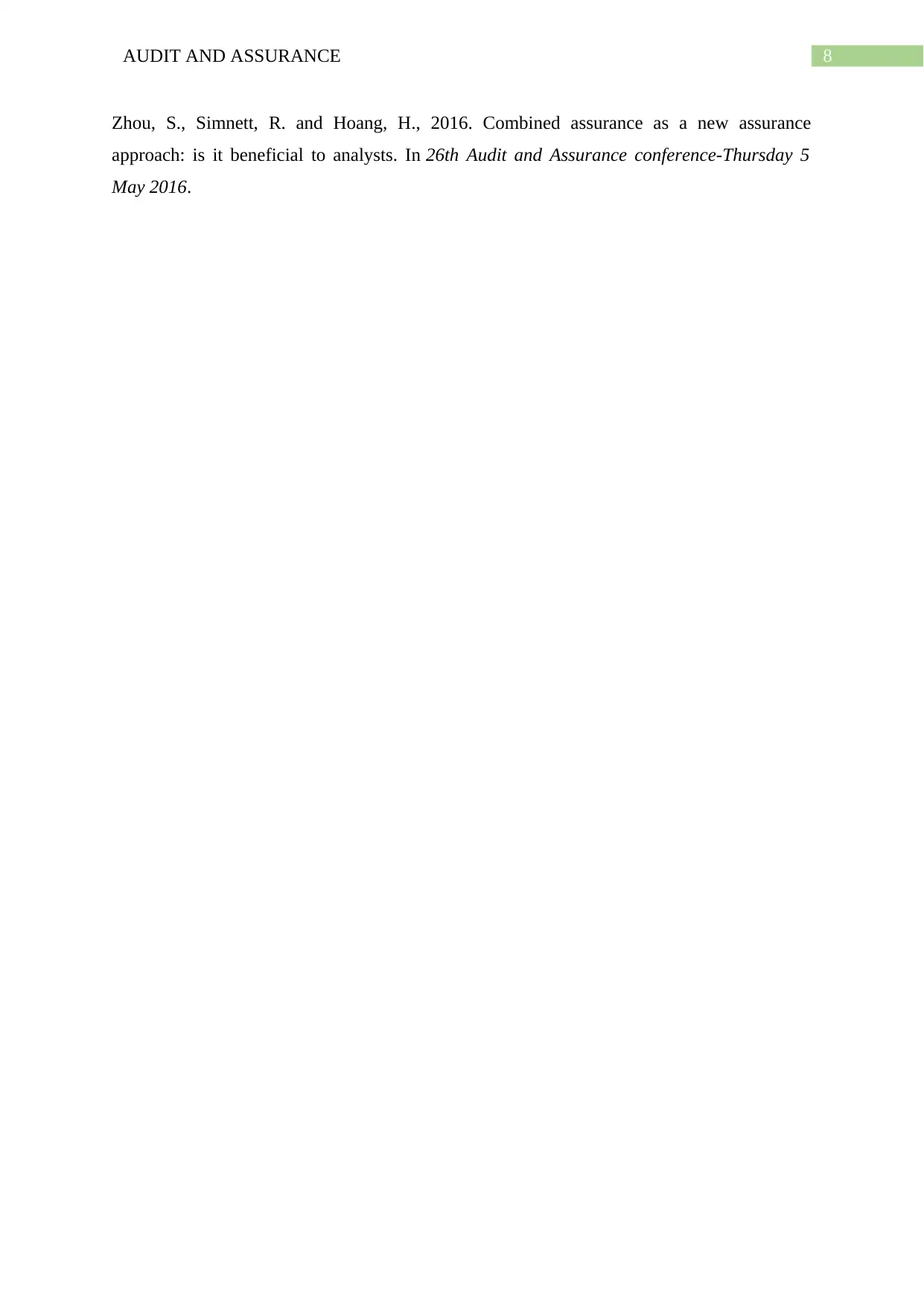
8AUDIT AND ASSURANCE
Zhou, S., Simnett, R. and Hoang, H., 2016. Combined assurance as a new assurance
approach: is it beneficial to analysts. In 26th Audit and Assurance conference-Thursday 5
May 2016.
Zhou, S., Simnett, R. and Hoang, H., 2016. Combined assurance as a new assurance
approach: is it beneficial to analysts. In 26th Audit and Assurance conference-Thursday 5
May 2016.
⊘ This is a preview!⊘
Do you want full access?
Subscribe today to unlock all pages.

Trusted by 1+ million students worldwide
1 out of 9
Related Documents
Your All-in-One AI-Powered Toolkit for Academic Success.
+13062052269
info@desklib.com
Available 24*7 on WhatsApp / Email
![[object Object]](/_next/static/media/star-bottom.7253800d.svg)
Unlock your academic potential
Copyright © 2020–2026 A2Z Services. All Rights Reserved. Developed and managed by ZUCOL.





